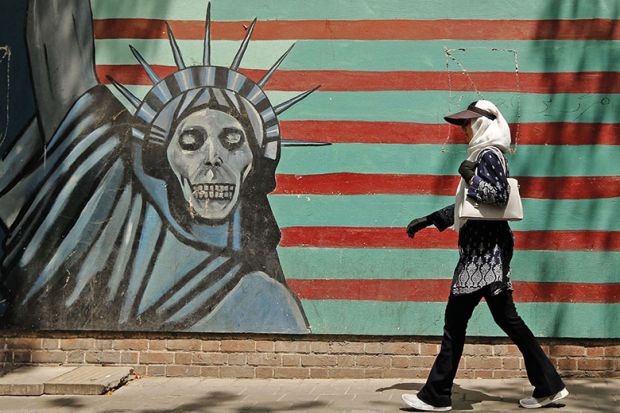When Iran struck a deal with world powers over its nuclear programme in 2015, there was widespread optimism that its higher education sector would enjoy a new era of international collaboration.
More than three years on, and after the election of Donald Trump as US president, the mood music is very different. Iranian scholars and students have been hit with restrictions on travel to the US, while the stepping-up of US sanctions – and Mr Trump’s bid to turn other countries against Tehran – has put the brake on the country’s economy.
But Mahmoud Nili Ahmadabadi, president of the University of Tehran, told Times Higher Education that his institution was still “looking to boost” its international collaborations. “Science has no borders,” he said.
In the opinion of Professor Nili Ahmadabadi, also professor of metallurgy at Tehran, growing global tensions make academic partnerships even more important. When Mr Trump first announced a 90-day stay on immigration from Iran and other five majority-Muslim countries in 2017, Professor Nili Ahmadabadi wrote a letter warning that Iranians had often been “among the brightest researchers and students in many universities in the US”. Mr Trump’s decision “mainly works against [the] US national interest”, Professor Nili Ahmadabadi warned.
“Academic diplomacy is now well recognised by countries worldwide, since scientists can work together regardless of political tension,” Professor Nili Ahmadabadi told THE. “Not only do Iranian universities have good collaborations locally – with Russia, Turkey, Iraq and Pakistan – but also with America, Canada and Europe still.”
The travel “ban” is now in its third iteration, after previous versions were struck down by the courts. Although it suspends immigration from Iran, those with student and exchange visitor visas can enter the US, albeit with enhanced screening.
Professor Nili Ahmadabadi said that the restrictions were yet to have a significant impact, and that there was “no limit” on scholarly exchange between Iran and other countries.
Tehran continues to offer dual-degree programmes with Indiana University-Purdue University Indianapolis; Professor Nili Ahmadabadi said that this programme “may have some problem with visas [in future], but there is no big problem yet”.
Professor Nili Ahmadabadi said that global networking was important for students, to improve their employability. As such, and despite the growing global tensions – as well as concern over the fate of prominent international detainees in Iran, such as Imperial College London professor Abbas Edalat, a British-Iranian mathematician – Tehran is also keen to attract foreign students.
As public funding for higher education in the country comes under pressure, international student revenue was becoming more important, Professor Nili Ahmadabadi said. “Recently we are starting to offer some curricula in English, and we have already started to have more international students,” he explained.
When it comes to funding, the university is perhaps a victim of its own success. The University of Tehran is held up as an engine of development in Iran, Professor Nili Ahmadabadi said, and this had led policymakers to believe that a university in each city across the country could have a similar impact.
Rapid expansion in the number of public institutions in an economy under pressure meant that funding for established universities has decreased.
Professor Nili Ahmadabadi said that he hoped that his university could have similar influence on freedom of expression and transparency in Iran, key areas of concern for human rights campaigners. “Iranian society at its heart is an open one, but you find that official freedom has its limits,” he said.
Influencing the quality of government decision-making is another key aim, albeit one with challenges attached.
“There are problems with Iranian society and the economy, so the university should show [that] it is looking for solutions and recommendations,” Professor Nili Ahmadabadi said. “We think that the university has already informed government about how to handle problems – in the environment, economy or society – then nobody listens.”
Nevertheless, he is committed to maintaining a constructive approach.
“We have to be on the path of problem-solving,” Professor Nili Ahmadabadi said. “We are designing clustering systems with different universities, where specialists come together to focus on a problem and how to advise the government.
“At the university, we are increasing university support – including financial – for the main Iranian challenges, societal, environmental, political and so on. We think the scientific capacity of the university can be [increased] much more –there are many jobs left we have to do.”
POSTSCRIPT:
Print headline: Academic diplomacy is answer to tension with West, says Tehran chief
Register to continue
Why register?
- Registration is free and only takes a moment
- Once registered, you can read 3 articles a month
- Sign up for our newsletter
Subscribe
Or subscribe for unlimited access to:
- Unlimited access to news, views, insights & reviews
- Digital editions
- Digital access to THE’s university and college rankings analysis
Already registered or a current subscriber? Login








